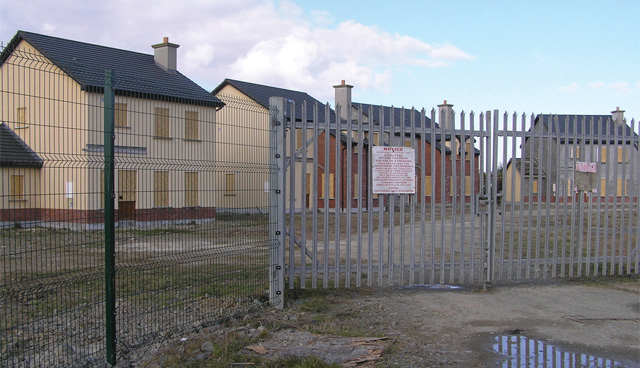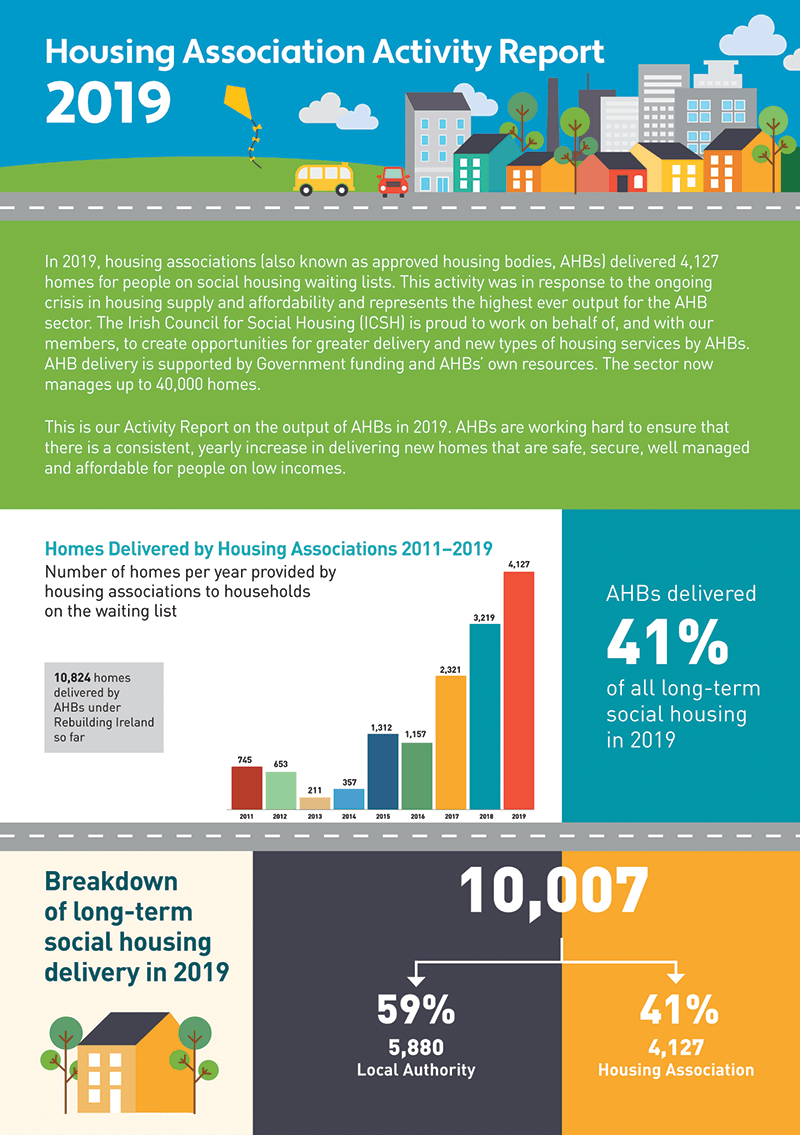
Covid-19 and homelessness
21st July 2020
National Vacant Housing Reuse Strategy: Update
21st July 2020Social housing: A socio-economic solution

The delivery of social and affordable housing contributes to many public policy objectives as well as people’s quality of life and well-being. This article outlines some important economic and social impacts, with a particular focus on the not-for-profit housing sector. CEO with the Irish Council for Social Housing (ICSH), Donal McManus writes.
Established in 1982, the Irish Council for Social Housing is the national federation of housing associations and currently has 270 members. Interchangeably known also as approved housing bodies (AHBs), ICSH housing association members, operating in urban and rural areas, collectively comprise a sector that will have up to 40,000 homes accommodating 100,000 people in 2020.
These homes, owned and managed by AHBs, accommodate families and children, older people, homeless households, people with disabilities and individuals, alongside support services for those people with mortgage problems. The sector comprises larger developing housing associations, local and regionally based AHBs, as well as those AHBs specifically focusing on special groups or new emerging housing problems.
Delivery, investment and timing
In 2019, there were 10,007 homes provided by local authorities and approved housing bodies. Of these, 4,129 or 41 per cent were delivered by AHBs alone, representing the sector’s highest ever annual output of homes, as indicated at the launch of the recent ICSH 2019 Activity Report (see right). There has been a significant increase in activity in the sector since 2013, and particularly since the introduction of the increased investment and targets for social housing included in Rebuilding Ireland.
The new Programme for Government: Our Shared Future, contains many positive commitments for social and affordable housing, including a firm commitment to 50,000 social housing units as well as a range of programmes for affordable rental and ownership. This is one of the most significant continuous scales of investment in recent decades and should provide certainty for planning new projects.
It does appear that investment in housing is now going to break with long held tradition and is finally pointing to a counter cyclical investment approach, either by accident, design or for pragmatic reasons of housing need. In the late 1980s, and from 2009-14, Exchequer cutbacks resulted in social housing investment being heavily curtailed and consequently, caused major reductions in the supply of new social housing units. The housing sector is still feeling the impact and an estimated 30,000 social rented homes were not built during this latter period.
Economic impact
The social housing sector has rebounded to a significant level in recent years and has created significant economic activity in the construction sector as well the property related services areas. The ICSH previously estimated that for every 10 construction jobs there were seven additional jobs created in other housing activities and services.
Gross value added (GVA) for social and indeed affordable investment would be significant. Joint ventures between housing associations and private construction companies, including design and build as well as turnkey projects, have sustained employment in the construction sector locally, regionally, and nationally.
This is important as it ensures a significant part of the investment is recycled and redistributed within Ireland. This is also supported by the European Commission, which in its most recent Semester Report on Ireland, recommended that a key priority be state investment in social and affordable housing. The Commission has emphasised the high labour intensity nature of employment activity both in residential construction as well its other key flagship of a Green Deal for EU Member states.
The new green renovation wave would include the upgrade and refurbishment of homes. In Ireland, within the housing association sector it is estimated that up to 10,000 homes (including very old properties) which would benefit from retrofitting, creating employment and training opportunities, reducing fuel poverty for tenants and ensuring continued long-term sustainability of the stock.

Capturing and responding to wider affordability
Across the EU, there are over 24 million social rented homes provided by non-profit housing associations, public housing authorities and cooperatives. This then is added to various types of affordable rental and ownership options. A growing trend has been the dearth of affordable housing in many major cities throughout the EU. Lack of affordable housing in EU cities is impacting on labour mobility and competitiveness.
Social housing eligibility in Ireland in income terms basically relates to the first four income deciles in CSO statistics, while ‘affordable housing’ points to between the fourth and seventh income decile of households and with housing costs overburden of 30 per cent or more. The OECD has also highlighted the housing needs of intermediate income groups caught between social housing eligibility limits on one hand, and not being able to access private ownership or pay market rents on the other.
The Government has a role here especially where there has been market failure to meet the housing need of these targeted households. EU member states can define for themselves the scope and parameters what is known as the Services for General Economic Interest (SGEI) for social and affordable rental housing, where the market has failed to meet a public policy objective.
Social impact
Though it is often characterised as a single housing solution, social housing is not homogenous. Importantly, it now covers an increasing spread of housing options for families, older people, the homeless, people with disabilities, including mental ill-health, mortgage to rent and regeneration programmes. Social housing, provided by both local authorities and housing associations, has proved to be remarkedly resilient and durable in the face of the Covid-19 pandemic.
There are many positive and measurable social impacts that derive from the varied types of social housing delivered by housing associations. For instance, targeted housing solutions for homeless households, including the increased application of Housing First, have yielded successful tenancy outcomes of up 85 per cent. This is coupled with the allocations provided by mainstream housing associations to homeless households from the local authority waiting lists.
Additionally, a component of the housing solution for older people is the provision of supported accommodation, including the option of on-site supports. Supported housing for older people provided by housing associations, as part of the housing and care continuum, has prevented many older people moving into nursing and residential care settings prematurely. This has enabled older people to remain in their local communities, close to friends and families, while retaining independence.
Supported housing options have had many socio-economic and health benefits, particularly where some older households may be over cared for and isolated in residential settings. There are around 10,000 homes incorporating services suitable for older people being managed by housing associations.
However, the projected increase of people aged over 65, as indicated by the CSO, is to increase by almost 1 million between 2016 and 2051 and to over 25 per cent of the population. In housing terms, this means much more planning and housing delivery is required now we can see sight of the demographic shift. For some people with disabilities, the transition from larger congregated settings can bring enhanced quality of life, although this needs to occur at a significantly greater scale.
More generally, good quality affordable housing has a positive impact on health outcomes, educational attainment levels as well as wider planning policies for contributing to reducing social segregation. Before we seek more investment, one key consideration is to imagine society without sufficient social and affordable housing with the subsequent negative impact on many lives and communities. The socio-economic impact is considerable and far-reaching and can have a key role in the national recovery.
T: +353 1 661 8334
E: donal@icsh.ie
W: www.icsh.ie






